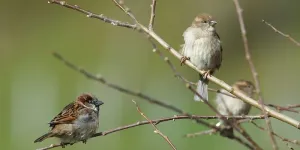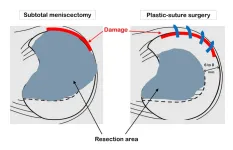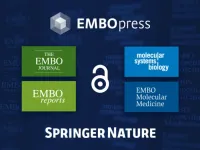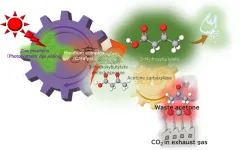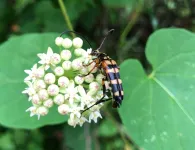(Press-News.org) The European Research Council (ERC) has awarded a prestigious Advanced Grant of EUR 2.5 million ($2.6 million) over 5 years to Professor Bernt-Erik Sæther at the Norwegian University of Science and Technology's (NTNU) Department of Biology.
The money will go to find out how we can save species that are in danger of becoming extinct.
“The aim is to develop rules of thumb to identify what is needed to prevent a species from dying out in an area in the short term. At the same time, we must ensure that a population’s ability to adapt to changing environmental conditions is permanent over time,” says Sæther.
Species dying out rapidly
Species extinction is one of the biggest challenges humanity now faces, Sæther said. Species are disappearing to an extent that has hardly happened before in Earth's history. Since species are the building blocks of all ecosystems on earth, the consequences are great when species die out quickly.
“The ecosystem services we enjoy from the natural world that we all depend on are in danger of being lost,” Sæther said.
Sæther’s five-year project is called Eco-Evolutionary Rescue of Fragmented Populations (EcoEvoRescue).
Human activity main reason
Species die out mainly due to environmental changes caused by various forms of human activity.
The Intergovernmental Science-Policy Platform on Biodiversity and Ecosystem Services (IPBES) has identified these main causes in priority order:
• Changed land use, such as clear-cutting of forests and drainage of marshes to make room for agriculture, industry and housing for an ever-increasing human population.
• Second worst is the direct exploitation of nature's many species, from hunting and overfishing to gathering firewood.
• Next comes climate change, ahead of pollution and alien species spreading into areas where they do not belong.
Relies on mathematical models and house sparrows
Sæther and his group will use advanced mathematical models to describe the viability of house sparrow populations on islands along the Helgeland coast.
Researchers at NTNU have worked here since the early 1990s. They have detailed knowledge of almost all house sparrow individuals found within a large geographical area.
They will use this model system to uncover which factors determine the chance of an island population becoming extinct or not.
“Using advanced molecular genetic techniques, we can also construct pedigrees for several tens of thousands of house sparrows in this system, Sæther said.
The researchers will use this information to figure out which characteristics make some individuals better than others at passing on their genes to subsequent generations.
Very comprehensive analysis
Researchers rarely have control over almost all individuals of a species within a large geographic area.
“This makes this project one of the most comprehensive analyses of Darwin's basic theory of evolution through natural selection that has ever been carried out in a wild population,” Sæther said.
These results will in turn be used to understand how quickly animals and birds can adapt to changed environmental conditions, and thus survive.
Long-term investment pays off
This interdisciplinary EU project is the result of a long-term investment in this type of research at NTNU.
“If we manage to get the ground-breaking results we are aiming for, this will undoubtedly be important for drawing up concrete measures that can reduce the extent of the natural crisis also on a global level,” Sæther said.
The project is therefore an important part of the Gjærevoll Centre for Foresight Analyses of Biodiversity. This multidisciplinary research centre was established by NTNU to ensure a transition to greener technologies and sustainable development.
An overall aim of the centre is to form an arena for the rapid implementation of top basic research into practical management. This EU-funded project will help make this possible.
END
Prestigious EU support to save species
A European Research Council Advanced Grant to investigate how species can survive in a changing environment
2023-03-30
ELSE PRESS RELEASES FROM THIS DATE:
Children with high blood pressure often become adults with high blood pressure
2023-03-30
Statement Highlights:
Primary hypertension—high blood pressure that is not due to an underlying medical condition—occurs in up to 5% of children and adolescents in the U.S. and other countries.
Having high blood pressure as a child often leads to high blood pressure in adulthood, which may increase the likelihood of heart disease and stroke, as well as cause damage to the kidneys, eyes and more.
Some risk factors that increase the chances for high blood pressure in children are modifiable, while others are not.
Regular and appropriate assessment of blood pressure levels in children is important, as there are often no symptoms of high blood pressure.
Public health initiatives ...
Cacao lovers rejoice: Cacao of Excellence R&D Laboratory and Training Centre unveiled
2023-03-30
ROME, ITALY - Cacao of Excellence is proud to unveil its new state-of-the-art cacao R&D laboratory and training centre. Located at Via Baccio Baldini 4 in Rome, the facility will be dedicated to exploring the depths of cacao quality and sensory analysis and revealing the diversity of cacao flavour profiles.
The laboratory and training centre will accommodate the processing and evaluation of cacao samples received from over 55 participating origins for the global Cacao of Excellence Awards, and will serve as a cacao quality processing and sensory training centre for cacao-producing origins.
Cacao of Excellence’s ...
A bright spot in the treatment of lateral disc meniscus injuries in for youth
2023-03-30
Osaka, Japan― Tearing their meniscus—a crescent-shaped piece of a soft cushion of cartilage located between the femur and tibia—can be devastating for young athletes. It is easily damaged in people with congenital lateral discoid meniscus or those that are physically active and once damaged, the meniscus cannot repair itself. The most common method has been to remove the damaged portion of the meniscus, but in recent years meniscus-sparing surgeries, that suture the margins of the meniscus at the tear, ...
Springer Nature and EMBO cooperate to publish the EMBO Press suite of journals
2023-03-30
30 March 2023 - EMBO Press has chosen Springer Nature to be their new publishing partner from 1 January 2024. Authors who publish in EMBO Press journals will benefit from the global reach of Springer Nature’s leading journals. In addition, authors will have the option to transfer manuscripts between journals in the EMBO Press and Springer Nature portfolios.
This announcement follows EMBO Press’ recent decision that to advance global discoverability, transparency and availability of published research outcomes all ...
Funding awarded to accelerate battery research, supporting ambitions of a cleaner, greener future
2023-03-30
Birmingham researchers developing novel battery recycling techniques have been awarded funding by the Faraday Institution, as part of a £29m package to re-focus and accelerate key battery research projects, which have been reshaped to focus on areas with the greatest potential for success.
Four of the six projects funded involve the University of Birmingham, and these include the Reuse and Recycling of Lithium Ion Batteries (ReLIB) project.
Led by Professor Paul Anderson, Co-Director of the Birmingham Centre for Strategic Elements and Critical Materials at Birmingham’s School of Chemistry, ReLIB aims to develop and scale novel recycling technologies that recover valuable ...
Validation of a therapy that overcomes chemotherapy resistance in colon and rectal cancer
2023-03-30
A multidisciplinary team made up of doctors and scientists from the Hospital del Mar Medical Research Institute (IMIM-Hospital del Mar) and the Institute for Research in Biomedicine (IRB Barcelona) has led a study, recently published in the Journal of Medicinal Chemistry, which proposes a therapeutic approach for preventing the development of resistance to chemotherapy with oxaliplatin, one of the standard treatments for colon and rectal cancer. The work, which also involved doctors from the Pathological Anatomy and Medical Oncology departments at Hospital del Mar, as well ...
Lynx reintroduction in Scotland? It’s complicated
2023-03-30
Plans to reintroduce the lynx in Scotland provoke a complex range of opinions, new research shows.
Lynx died out in Britain more than 1,000 years ago, but some conservation groups argue the species could help restore natural ecosystems.
The new study, by researchers from Vincent Wildlife Trust and the University of Exeter, investigated the views of stakeholders including farmers, land managers and conservationists.
“Our results show that views in Scotland about potential future lynx reintroduction are far more diverse, nuanced and complex than might have been assumed,” ...
Low concentration CO2 can be reused in biodegradable plastic precursor using artificial photosynthesis
2023-03-30
Poly-3-hydroxybutyrate—a biodegradable plastic—is a strong water-resistant polyester often used in packaging materials, made from 3-hydroxybutyrate as a precursor. In previous studies, a research team led by Professor Yutaka Amao from the Research Center for Artificial Photosynthesis at Osaka Metropolitan University, found that 3-hydroxybutyrate can be synthesized from CO2 and acetone with high efficiency, but only demonstrated this at higher concentrations of CO2 or sodium bicarbonate.
This new study aimed to reuse waste acetone from permanent marker ink and low concentrations of CO2—equivalent to exhaust gas from power plants, chemical ...
Novel drug offers hope for heart failure patients
2023-03-30
A novel drug is showing promise for alleviating heart failure, a common condition associated with sleep apnoea and a reduced lifespan.
The drug, known as AF-130, was tested in an animal model at Waipapa Taumata Rau, the University of Auckland where researchers found it improved the heart’s ability to pump, but, equally important, prevented sleep apnoea, which itself reduces lifespan (see Nature Communications). “This drug does offer benefit for heart failure, but it’s two for the price of one, in that it’s also relieving the apnoea for which ...
Symbiotic yeast helps longicorn beetles eat wood
2023-03-30
Even for insects, wood is a tough food source as it contains hard substances such as cellulose. To help make wood more palatable, some wood-feeding insects are assisted by symbiotic microorganisms that break down the components of wood into an edible form. A group from Nagoya University in Japan has isolated a symbiotic yeast from adults, larvae, and eggs of the Japanese longicorn beetle and identified specialized organs that store the yeast, allowing the beetles to break down the unpalatable components of wood. Their findings were published in PLOS ONE.
“I have been fascinated with longicorn beetles ...
LAST 30 PRESS RELEASES:
New data on spontaneous coronary artery dissection (SCAD) – a common cause of heart attacks in younger women
How root growth is stimulated by nitrate: Researchers decipher signalling chain
Scientists reveal our best- and worst-case scenarios for a warming Antarctica
Cleaner fish show intelligence typical of mammals
AABNet and partners launch landmark guide on the conservation of African livestock genetic resources and sustainable breeding strategies
Produce hydrogen and oxygen simultaneously from a single atom! Achieve carbon neutrality with an 'All-in-one' single-atom water electrolysis catalyst
Sleep loss linked to higher atrial fibrillation risk in working-age adults
Visible light-driven deracemization of α-aryl ketones synergistically catalyzed by thiophenols and chiral phosphoric acid
Most AI bots lack basic safety disclosures, study finds
How competitive gaming on discord fosters social connections
CU Anschutz School of Medicine receives best ranking in NIH funding in 20 years
Mayo Clinic opens patient information office in Cayman Islands
Phonon lasers unlock ultrabroadband acoustic frequency combs
Babies with an increased likelihood of autism may struggle to settle into deep, restorative sleep, according to a new study from the University of East Anglia.
National Reactor Innovation Center opens Molten Salt Thermophysical Examination Capability at INL
International Progressive MS Alliance awards €6.9 million to three studies researching therapies to address common symptoms of progressive MS
Can your soil’s color predict its health?
Biochar nanomaterials could transform medicine, energy, and climate solutions
Turning waste into power: scientists convert discarded phone batteries and industrial lignin into high-performance sodium battery materials
PhD student maps mysterious upper atmosphere of Uranus for the first time
Idaho National Laboratory to accelerate nuclear energy deployment with NVIDIA AI through the Genesis Mission
Blood test could help guide treatment decisions in germ cell tumors
New ‘scimitar-crested’ Spinosaurus species discovered in the central Sahara
“Cyborg” pancreatic organoids can monitor the maturation of islet cells
Technique to extract concepts from AI models can help steer and monitor model outputs
Study clarifies the cancer genome in domestic cats
Crested Spinosaurus fossil was aquatic, but lived 1,000 kilometers from the Tethys Sea
MULTI-evolve: Rapid evolution of complex multi-mutant proteins
A new method to steer AI output uncovers vulnerabilities and potential improvements
Why some objects in space look like snowmen
[Press-News.org] Prestigious EU support to save speciesA European Research Council Advanced Grant to investigate how species can survive in a changing environment
